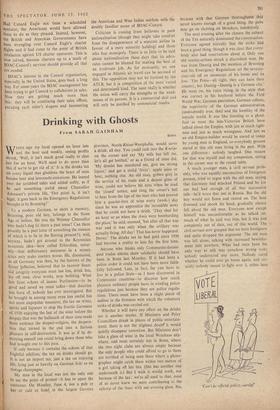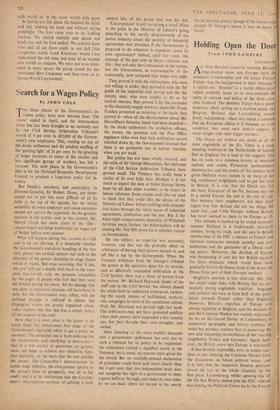Drinking with Ghosts
From SARAH GAINHAM
BONN
WEEKS ago my local opened an hour late and the host said weakly, seeing profits shrink, 'Well, it isn't much good really to shut just for an hour. We'll need to do more than this if we're to get rid of it.' It is the drinks tax on every liquid that gladdens the heart of man besides beer and lemonade-imitations. He leaned over the scrubbed table and added softly, as if he said something awful about Chancellor Adenauer's private life, 'Our point is, it isn't legal; it goes back to the Emergency Regulations brought in by Bruening!'
To a modern German, so short is memory, Bruening, poor old boy, belongs to the Stone Age or before. He was the Weimar Chancellor who hadn't dug (is there a past tense? Can there Possibly be a past tense of something the essence of which is to be in the fleeting present?); well, anyway, hadn't got around to the Keynesian economic idea—here called Erhardian, natur- ally—that deflationary measures in a money crisis only make matters worse. He, dominated, as all Germany was then, by the horrors of the Great Inflation, believed that to recover finan- cial integrity everyone must use less, drink less, lay off men, close works, stop building. What last faint echoes of insane Puritanism—to be good and saved we must suffer—that doctrine Was born of, nobody has ever investigated. But he brought in among many, even less useful but not more unpopular measures, the tax on wines, spirits and liqueurs to stop the frantic Germans of 1930 enjoying the last of the wine before the despair that was the hallmark of their time made them embrace the despair-religion, the despera- tion that turned in the end into a furious pleasure in self-destruction. It was as if by de- stroying oneself one could bring down those who had brought one to this pass. , If only because it contains the echoes of that frightful nihilism, the tax on drinks should go. It is not an import tax, just a tax on enjoying life, lying just as heavily on German Sekt as on vintage champagne.
My man in the local was not the only one to see the point of protest—it has to upset the customer. On Monday, June 4, not a pub or bar or cad or hotel in the largest German province, North-Rhine-Westphalia, would serve a drink, all day. You could rush into the Kneipe on the corner and say 'My wife has left me, let's all get bottled,' or as a friend of mine did, 'My dentist has murdered me, give me strong liquor,' and get a stolid 'Nein':' apple juice or beer, nothing else. An old man, grdwn grey in the service of his trade and a decent glass of wine, could not believe his eyes when he read the 'closed' notice, and rang the owner's bell to hear from the lips of the man who had poured him a quarter-litre of wine every (week-) day since he was an apprentice the incredible news that he could not have a drink. 'They shut for an hour or so when the Amis were bombarding the place,' he said, stunned, 'but after all that was war and it was only when the artillery was actually firing. All day! That has never happened. Never.' The drinks tax he had paid since 1930 had become a reality to him for the first time.
Anyone who thinks only Communist-domin- ated trades unions show solidarity should have been in Bonn last Monday. If it had been a police order it could not have been more faith- fully followed. Less, in fact, for you have to live in a police State—as I have discovered in Communist countries—to discover how much pleasure ordinary people have in evading police regulations just because they are police regula- tions. There •must have been a slight pinch of sadism in the firmness with which the voluntary strike of drinks was carried out.
Whether it will have any effect on the drinks tax is another matter. If Ministers and Privy Councillors drank in places of public entertain- ment, there is not the slightest doubt it would quietly disappear tomorrow. But Ministers don't take a glass of wine in the local Weinhaus any- where, and most certainly not in Bonn, where the two night clubs are always empty because the only people who could afford to go to them are terrified of being seen there where a photo- grapher might catch them within two metres of a girl taking off her bra. (She has another one underneath it.) But I wish it would work, not because of the tax : we're all used to that, most of us never knew we were contributing to the upkeep of the State with our evening glass. No, because with that German thoroughness that never knows enough of a good thing, the pubs may go on shutting on Mondays, indefinitely.
The next evening after the closure the subject of the Tax naturally dominated the conversation. Everyone agreed stoically that the strike had been a good thing, though it was clear that every- body also had reservations about it. Only one old master-artisan struck a discordant note. He was from Danzig and the mention of Bruening and his Emergency Regulations set the seventy- year-old off on memories of his home and its loss. 'The Poles—all right, they can have their country, but Danzig—Danzig is a German city.' He went on, his voice rising, in the style that was correct in his boyhood before the First World War, German patriotism, German culture, the superiority of the German administration, (undoubtedly true, that) and the hostility of the outside world. It was like listening to a ghost. Just so must the late-Victorian British have talked about the Empire, with just as much right- ness and just as much wrongness. And just as an old Empire-builder would be stared at today by young men in England, so everybody present stared at this old man living in the past. With one difference : nobody laughed. One reason for that was myself and my companion, sitting in the corner seat at the round table.
A much younger man, a civil servant prob- ably, who was equally unconscious of foreigners present, tried to argue with the old man, saying that Germany had attacked Poland and he for one had had enough of all that nationalist talk—he'd worn that out in Russia. But the old boy would not listen and ranted on. The host frowned and shook his head; gradually silence fell about the old man. Everyone now except himself was uncomfortable as he talked on; much of what he said was true, but it was just completely out of date, out of this world. The civil servant now grasped that we were foreigners and quite dropped the argument. The old man was left alone, talking with increased bewilder- ment into nowhere. What had once been the only way to talk was somehow wrong now; nobody understood any more. Nobody cared whether he could ever go home again, and cer- tainly nobody meant to fight over it, either here
11
'Can't be official policy, surely?'
t■ith words or in the outer world with guns.
At last he too fell silent. He finished his drink and left, shaking his head and without saying goodnight. The host came over to us, looking anxious. We smiled ruefully and shook our heads too, and the host smiled. We ordered more wine and all sat there cosily in our dull little prosperous world. Lord Kitchener would I ave understood the old man, but none of us wanted new worlds to conquer. We were not even inter- ested in outer space; the group round the bar mentioned Herr Carpenter and then went on to discuss World Cup football.



































 Previous page
Previous page